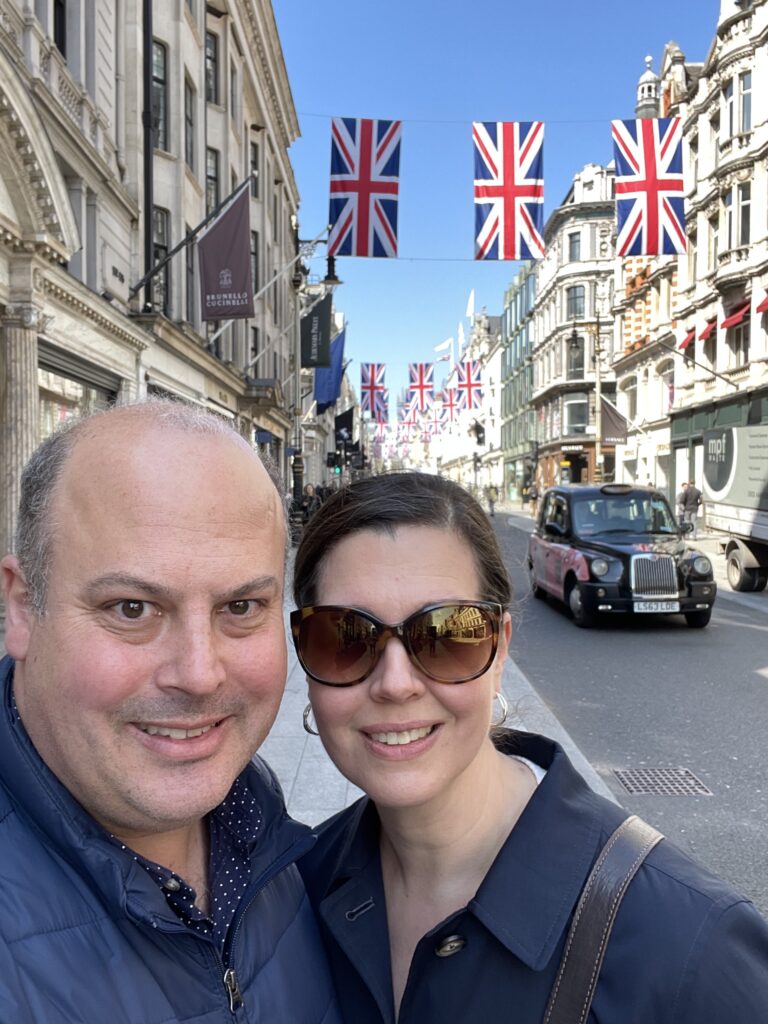Drs. Bridgham and Stretter Receive Teaching Award

Congratulations to Dr. Elizabeth Bridgham and Dr. Robert Stretter, both associate professors of English, recipients of Providence College’s 2023 Innovation in Teaching Excellence Award
Dr. Bridgham and Dr. Stretter received the award for their work leading the 2023 “Civ in London” program, a semester-long study abroad program in which they co-taught a DWC 202 colloquium entitled “Global London” as well as two English courses, “The London Stage” and “Imagining England in Literature and Film.”
Their teaching innovations involved putting into practice Civ in London’s guiding principles of “the city as classroom” and “the city as text.” Their courses were highly experiential, emphasizing hands-on learning in the physical places that students were studying — for example, walking in the footsteps of Shakespeare and other Renaissance dramatists in Southwark or learning to write with a quill in Charles Dickens’s actual London townhouse, just a few blocks from their classroom, after reading Oliver Twist. Every week split class time between the classroom and outings into the city (or beyond, such as Bath, Belgium, and Athens).
Dr. Stretter and Dr. Bridgham describe three areas in which their time in London inspired them to try new approaches to teaching:
- “Cultural Geography: one example of an experiential learning assignment that we designed is “Mapping Whitechapel,” a project that asked students, working in pairs, independently to visit Whitechapel, an important multi-cultural East London neighborhood that is well off the tourist track, and to create maps that challenge and expand our notion of what cultural London landmarks are and could be. Students photographed and researched familiar sites like museums, galleries, and monuments, but they also investigated local parks, job centers, examples of street / graffiti art, and restaurants. These spaces, intended for and created by locals, got them closer to understanding what it means to be a Londoner from a variety of perspectives.
- Crowd-sourced Learning (“Tuesday Tips”): every Tuesday, we would devote time at the beginning of class for each student to share something that they learned about London – a recommendation of a place to visit, a warning about something to avoid, advice on dealing with workloads or homesickness, etc. This allowed students to learn from one another and to increase their engagement with the city. We were impressed by how many students’ experiences were enriched by following up on information learned from their classmates. We kept a list of the weekly tips on our class Sakai page for easy reference.
- Technology: because it was not practical for students to take many textbooks to London, we relied more than usual on digital platforms as sites of student learning — usually with excellent results. One component of the “Mapping Whitechapel” assignment was the creation of a personalized virtual map (using Google Maps) to present the students’ findings to the class as a whole; we also created a class Whatsapp group that allowed us not only to communicate practical information (directions, meeting times, etc.), but to create virtual discussions in real time during class outings. For example, during a visit to a museum, the class would be asked to find and photograph, on their phones, works of art relevant to a particular theme. They would then post their photos to the Whatsapp group, after which we would meet at a café or pub to discuss their finds, with the images at everyone’s fingertips, creating a kind of crowd-sourced lesson. It was both instructive and fun!”





